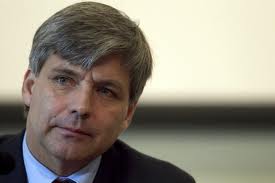By Andrew Warshaw, chief correspondent
August 2 – The FIFA-appointed expert who first cautioned about the dangers of taking the 2022 World Cup to Qatar says he made it abundantly clear that playing in the tiny Gulf state would be too hazardous – but was ignored by the majority of voting members.
In the first of a two-part interview with Insideworldfootball, Chile’s Harold Mayne-Nicholls, who led the FIFA inspection team that examined the credentials of all nine candidates for both the 2018 (won by Russia) and 2022 World Cups, says holding the two ballots simultaneously in December 2010 was always going to be a recipe for disaster because of potential deal-making between executive committee members.
“FIFA made two big mistakes,” said Mayne-Nicholls, who was head of the Chilean FA at the time of his report. “The first was deciding to have a rotation system. Brazil, for instance, was the only country bidding for 2014 from South America and that’s not within the spirit of the World Cup. When it came to 2022, it had to go to one of two continents, Asia or North America. There was no other choice.”
“The second big mistake was having two bids at the same moment, the only reason for which seems to be to increase marketing and commercial potential in terms of contracts. There was absolutely no football reason.”
Although the technical report presented by Mayne-Nicholls and his team flagged up several flaws about a Qatar World Cup – not least about the heat – it was ultimately neglected by FIFA, an oversight that led directly to the ongoing global debate over whether to switch 2022 to winter.
“We knew Qatar would be very, very risky and we put that in our report,” said Mayne-Nicholls. “The Qataris told us they would have a system to cool the pitches, cool the stands and cool the training grounds. But the question then was, what if, in just one practise, the cooling system failed? Our concern was also with the fans. When it’s mid-summer in Qatar, sometimes you cannot even walk.”
Mayne-Nicholls said it was clear from the start, however, that his report – understood to have put the United States as the top recommendation for 2022 and Russia below several of its rivals for 2018 – risked being sidelined.
“Everyone knows that with two bids going together, you could share votes,” he said. “If we’d only had one vote, that would have been impossible. In my opinion, many exco [FIFA executive committee] members took their decision before even seeing the report. Otherwise it makes no sense. I didn’t have the authority to push them into accepting what we were saying. I just did my job, I wrote what I saw, and I told them what was and what was not the best option.”
FIFA President Sepp Blatter has now decided that a winter tournament would be preferable as a one-off and is to put the idea to the executive committee, probably in October. But Mayne-Nicholls believes that as soon as Qatar won the vote, FIFA should have set up a separate Task Force to look into whether the tournament should be held in winter or summer rather than wait for almost three years.
“In my opinion, immediately after the decision was taken, we should have had a group of people looking into when it should be played. Instead nothing was done. For me it was a big, big surprise that the President has suddenly come out and supported a switch to winter because in the past he always said no way. Plus I talked a couple of times to the general secretary and he said they could not move the dates.”
It wasn’t only the heat that troubled Mayne-Nicholls and his inspection team. “A World Cup in the United States, with the capacity of the stadiums, could have accommodated around five million spectators,” he said. “In Qatar, the figure will be nearer three million. That’s a huge difference. The World Cup is not only for those who voted, it’s for the people. Two million people will now miss that opportunity and you have to take that into consideration.”
Mayne-Nicholls, who is no longer involved with the game at the highest level and is chairman of a non-profit Foundation called Ganamos Todos that was created in June 2011 to introduce more children into sport, believes that although the searing summer Gulf heat is by no means ideal and a potential health risk to players, on balance playing the World Cup at its traditional time would be preferable to a move to winter.
Playing in November and December would wreck the entire footballing calendar, he says, and not just in Europe. As a compromise, he suggests, games in Qatar could be played from early evening onwards.
“I have no magical solution but maybe you could play at 6pm, 9pm and midnight. At least the sun would have gone down. I personally think if we switched to winter, it would create huge trouble not only for the English and Spanish but for several other countries around the world. South America will be playing, so will central America, Africa and Asia. We have to think about the whole football family. Football is not just for the FIFA exco, it’s for the general public.”
Contact the writer of this story at moc.l1734852818labto1734852818ofdlr1734852818owedi1734852818sni@w1734852818ahsra1734852818w.wer1734852818dna1734852818

